英语作文 克隆观点
- 格式:wps
- 大小:12.00 KB
- 文档页数:1
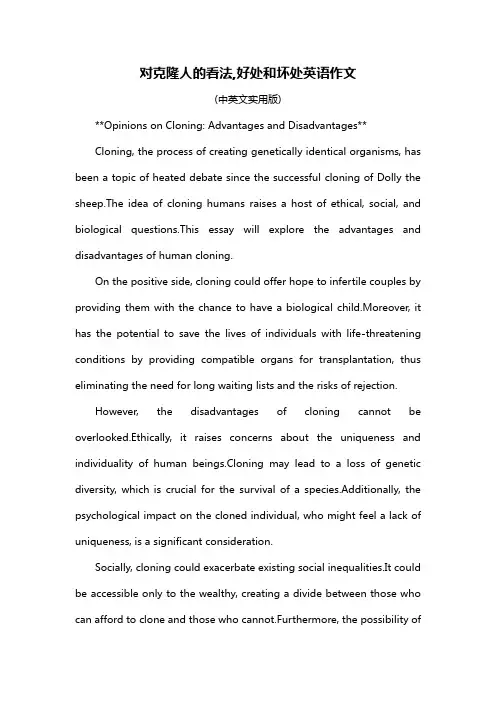
对克隆人的看法,好处和坏处英语作文(中英文实用版)**Opinions on Cloning: Advantages and Disadvantages**Cloning, the process of creating genetically identical organisms, has been a topic of heated debate since the successful cloning of Dolly the sheep.The idea of cloning humans raises a host of ethical, social, and biological questions.This essay will explore the advantages and disadvantages of human cloning.On the positive side, cloning could offer hope to infertile couples by providing them with the chance to have a biological child.Moreover, it has the potential to save the lives of individuals with life-threatening conditions by providing compatible organs for transplantation, thus eliminating the need for long waiting lists and the risks of rejection.However, the disadvantages of cloning cannot be overlooked.Ethically, it raises concerns about the uniqueness and individuality of human beings.Cloning may lead to a loss of genetic diversity, which is crucial for the survival of a species.Additionally, the psychological impact on the cloned individual, who might feel a lack of uniqueness, is a significant consideration.Socially, cloning could exacerbate existing social inequalities.It could be accessible only to the wealthy, creating a divide between those who can afford to clone and those who cannot.Furthermore, the possibility ofcloning for non-medical reasons, such as creating individuals with desired traits, raises concerns about eugenics and the devaluation of human life.Biologically, the health risks associated with cloning are a major concern.Cloned animals have often exhibited higher rates of birth defects, premature aging, and other health issues.The long-term consequences for cloned humans are still unknown.In conclusion, while cloning offers potential benefits such as solving infertility and providing organ matches, it also presents a range of ethical, social, and biological challenges.It is essential that society engages in a thorough and cautious examination of these issues before considering the widespread application of human cloning.**对克隆人的看法:利与弊**克隆,即制造基因完全相同的生物的过程,自成功克隆多莉羊以来,一直是社会热议的话题。
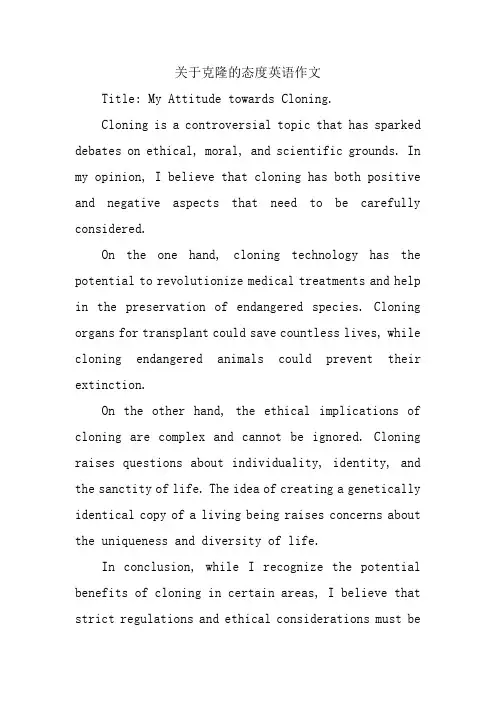
关于克隆的态度英语作文Title: My Attitude towards Cloning.Cloning is a controversial topic that has sparked debates on ethical, moral, and scientific grounds. In my opinion, I believe that cloning has both positive and negative aspects that need to be carefully considered.On the one hand, cloning technology has the potential to revolutionize medical treatments and help in the preservation of endangered species. Cloning organs for transplant could save countless lives, while cloning endangered animals could prevent their extinction.On the other hand, the ethical implications of cloning are complex and cannot be ignored. Cloning raises questions about individuality, identity, and the sanctity of life. The idea of creating a genetically identical copy of a living being raises concerns about the uniqueness and diversity of life.In conclusion, while I recognize the potential benefits of cloning in certain areas, I believe that strict regulations and ethical considerations must bein place to ensure that cloning is used responsibly and ethically. It is essential to approach cloning with caution and to prioritize the well-being and rights of living beings.中文翻译:我对克隆的态度。
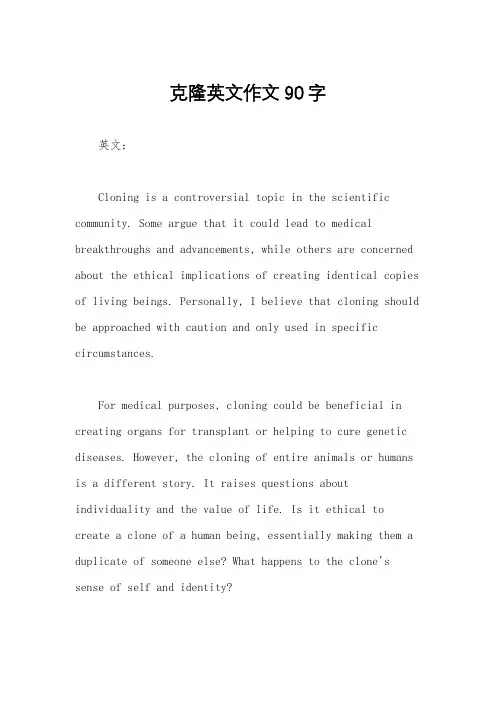
克隆英文作文90字英文:Cloning is a controversial topic in the scientific community. Some argue that it could lead to medical breakthroughs and advancements, while others are concerned about the ethical implications of creating identical copies of living beings. Personally, I believe that cloning should be approached with caution and only used in specific circumstances.For medical purposes, cloning could be beneficial in creating organs for transplant or helping to cure genetic diseases. However, the cloning of entire animals or humans is a different story. It raises questions aboutindividuality and the value of life. Is it ethical to create a clone of a human being, essentially making them a duplicate of someone else? What happens to the clone's sense of self and identity?Furthermore, there are also concerns about the safety of cloning. In the past, cloned animals have had health issues and abnormalities. It is important to thoroughly research and test the effects of cloning before it is widely used.Overall, while there may be potential benefits to cloning, it is important to approach it with caution and consider the ethical implications.中文:克隆是科学界一个备受争议的话题。
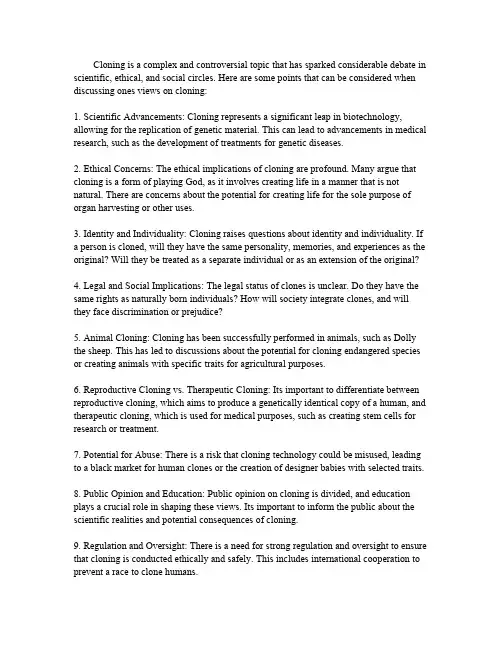
Cloning is a complex and controversial topic that has sparked considerable debate in scientific,ethical,and social circles.Here are some points that can be considered when discussing ones views on cloning:1.Scientific Advancements:Cloning represents a significant leap in biotechnology, allowing for the replication of genetic material.This can lead to advancements in medical research,such as the development of treatments for genetic diseases.2.Ethical Concerns:The ethical implications of cloning are profound.Many argue that cloning is a form of playing God,as it involves creating life in a manner that is not natural.There are concerns about the potential for creating life for the sole purpose of organ harvesting or other uses.3.Identity and Individuality:Cloning raises questions about identity and individuality.Ifa person is cloned,will they have the same personality,memories,and experiences as the original?Will they be treated as a separate individual or as an extension of the original?4.Legal and Social Implications:The legal status of clones is unclear.Do they have the same rights as naturally born individuals?How will society integrate clones,and will they face discrimination or prejudice?5.Animal Cloning:Cloning has been successfully performed in animals,such as Dolly the sheep.This has led to discussions about the potential for cloning endangered species or creating animals with specific traits for agricultural purposes.6.Reproductive Cloning vs.Therapeutic Cloning:Its important to differentiate between reproductive cloning,which aims to produce a genetically identical copy of a human,and therapeutic cloning,which is used for medical purposes,such as creating stem cells for research or treatment.7.Potential for Abuse:There is a risk that cloning technology could be misused,leading to a black market for human clones or the creation of designer babies with selected traits.8.Public Opinion and Education:Public opinion on cloning is divided,and education plays a crucial role in shaping these views.Its important to inform the public about the scientific realities and potential consequences of cloning.9.Regulation and Oversight:There is a need for strong regulation and oversight to ensure that cloning is conducted ethically and safely.This includes international cooperation to prevent a race to clone humans.10.Future Prospects:The future of cloning is uncertain.While it holds promise for medical and scientific advancements,it also presents significant challenges that society must grapple with.When writing an essay on cloning,its essential to explore these aspects in depth, providing a balanced view that considers both the potential benefits and the risks associated with this technology.Its also important to acknowledge the complexity of the issue and the diversity of opinions that exist.。
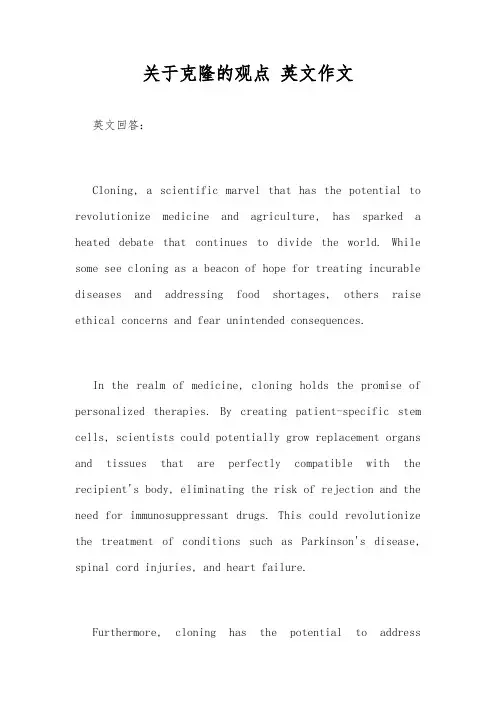
关于克隆的观点英文作文英文回答:Cloning, a scientific marvel that has the potential to revolutionize medicine and agriculture, has sparked a heated debate that continues to divide the world. While some see cloning as a beacon of hope for treating incurable diseases and addressing food shortages, others raise ethical concerns and fear unintended consequences.In the realm of medicine, cloning holds the promise of personalized therapies. By creating patient-specific stem cells, scientists could potentially grow replacement organs and tissues that are perfectly compatible with the recipient's body, eliminating the risk of rejection and the need for immunosuppressant drugs. This could revolutionize the treatment of conditions such as Parkinson's disease, spinal cord injuries, and heart failure.Furthermore, cloning has the potential to addresscritical issues in agriculture. By replicating animals with desirable traits, such as disease resistance or enhanced growth performance, farmers could improve livestock yields, reduce environmental impact, and increase food security for a growing global population. Additionally, cloning could help preserve endangered species and protect biodiversity.However, ethical concerns surround the potential misuse of cloning technology. Opponents argue that cloning humans could lead to designer babies and a eugenic society, where individuals are selected based on predetermined genetic traits. They also raise concerns about the psychological and social implications of creating human beings who are identical to others.Moreover, the long-term health effects of cloning remain largely unknown. While animal studies have shown some adverse outcomes, such as premature aging and increased susceptibility to disease, the full extent of these risks in humans is yet to be determined. Thus, it is crucial that cloning is approached with caution and under strict ethicalguidelines.In conclusion, the debate over cloning is multifaceted, involving complex scientific, ethical, and societal considerations. While cloning offers the potential to address pressing medical and agricultural challenges, it also raises concerns that must be carefully weighed. As scientists continue to refine cloning technology and its applications, it is essential to engage in ongoing dialogue, seek public input, and establish ethical frameworks to guide the responsible and judicious use of this transformative technology.中文回答:克隆,一项具有可能革新医疗和农业的科学奇迹,引发了一场持续分歧世界的激烈辩论。
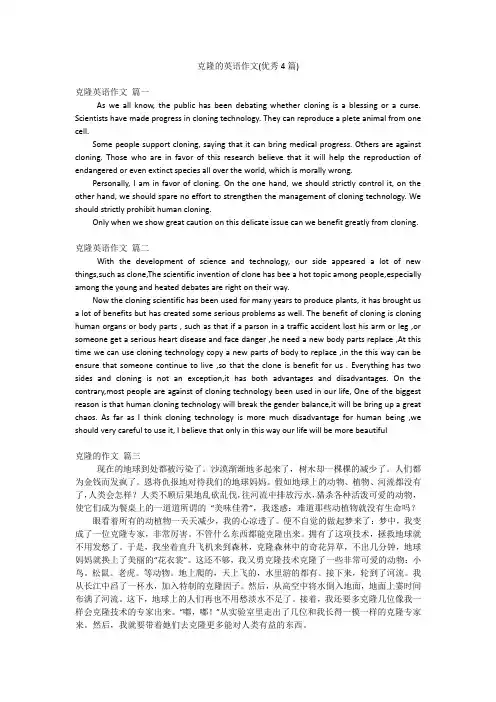
克隆的英语作文(优秀4篇)克隆英语作文篇一As we all know, the public has been debating whether cloning is a blessing or a curse. Scientists have made progress in cloning technology. They can reproduce a plete animal from one cell.Some people support cloning, saying that it can bring medical progress. Others are against cloning. Those who are in favor of this research believe that it will help the reproduction of endangered or even extinct species all over the world, which is morally wrong.Personally, I am in favor of cloning. On the one hand, we should strictly control it, on the other hand, we should spare no effort to strengthen the management of cloning technology. We should strictly prohibit human cloning.Only when we show great caution on this delicate issue can we benefit greatly from cloning.克隆英语作文篇二With the development of science and technology, our side appeared a lot of new things,such as clone,The scientific invention of clone has bee a hot topic among people,especially among the young and heated debates are right on their way.Now the cloning scientific has been used for many years to produce plants, it has brought us a lot of benefits but has created some serious problems as well. The benefit of cloning is cloning human organs or body parts , such as that if a parson in a traffic accident lost his arm or leg ,or someone get a serious heart disease and face danger ,he need a new body parts replace ,At this time we can use cloning technology copy a new parts of body to replace ,in the this way can be ensure that someone continue to live ,so that the clone is benefit for us . Everything has two sides and cloning is not an exception,it has both advantages and disadvantages. On the contrary,most people are against of cloning technology been used in our life, One of the biggest reason is that human cloning technology will break the gender balance,it will be bring up a great chaos. As far as I think cloning technology is more much disadvantage for human being ,we should very careful to use it, I believe that only in this way our life will be more beautiful克隆的作文篇三现在的地球到处都被污染了。
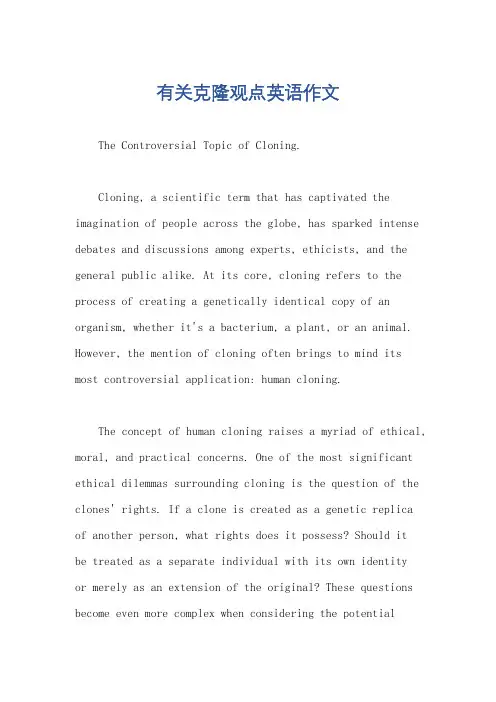
有关克隆观点英语作文The Controversial Topic of Cloning.Cloning, a scientific term that has captivated the imagination of people across the globe, has sparked intense debates and discussions among experts, ethicists, and the general public alike. At its core, cloning refers to the process of creating a genetically identical copy of an organism, whether it's a bacterium, a plant, or an animal. However, the mention of cloning often brings to mind its most controversial application: human cloning.The concept of human cloning raises a myriad of ethical, moral, and practical concerns. One of the most significant ethical dilemmas surrounding cloning is the question of the clones' rights. If a clone is created as a genetic replicaof another person, what rights does it possess? Should itbe treated as a separate individual with its own identityor merely as an extension of the original? These questions become even more complex when considering the potentialmisuse of cloning technology, such as creating clones for the purpose of organ harvesting or as slaves.Moreover, the process of cloning itself is fraught with potential risks and ethical challenges. Cloning requires the manipulation of cells and genes, a field that is still not fully understood. This manipulation can lead to unexpected genetic mutations or deformities, potentially causing immense suffering to the clone. Furthermore, the process of creating a clone often involves the destruction of embryos, a practice that many find morally unacceptable.On the other hand, there are also potential benefits of cloning that cannot be ignored. For instance, cloning could revolutionize the field of medicine. By creating clones of patients, doctors could study diseases in a controlled environment, potentially leading to new treatments and cures. Additionally, cloning could provide a source of organs for transplantation, saving the lives of thousands of people who currently die waiting for suitable donors.Another argument in favor of cloning is the potentialto preserve endangered species. By cloning rare or endangered animals, conservationists could creategenetically diverse populations, increasing the chances of their survival. This could be especially beneficial for species that are threatened by habitat loss, climate change, or other anthropogenic factors.However, even if we accept the potential benefits of cloning, we must still grapple with the ethical implications. For instance, while cloning for medical research could lead to new treatments and cures, it also raises the question of whether it is ethically permissibleto create beings solely for the purpose of experimentation. Similarly, while cloning for organ transplantation could save lives, it also raises concerns about the commodification of human life and the potential for exploitation.In conclusion, the topic of cloning is incredibly complex and multifaceted. It involves ethical, moral, and practical considerations that must be carefully weighed before any decisions are made. While the potential benefitsof cloning are undeniable, we must also be mindful of the potential risks and ethical challenges that it poses. As we continue to explore the frontiers of science and technology, it is crucial that we do so with a sense of responsibility and respect for all life.。
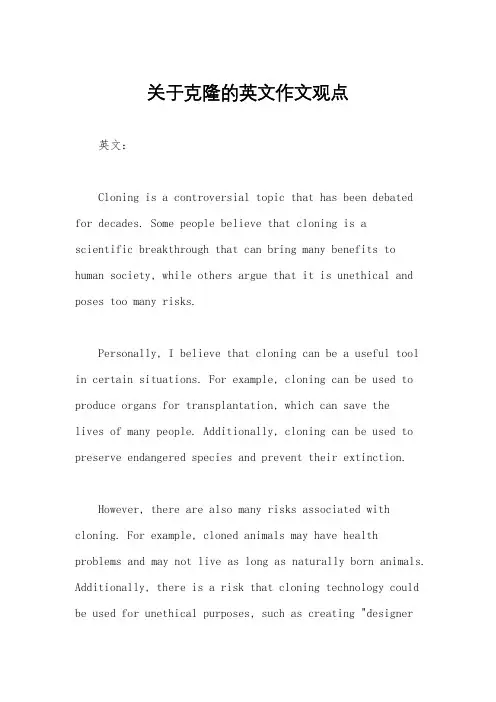
关于克隆的英文作文观点英文:Cloning is a controversial topic that has been debated for decades. Some people believe that cloning is ascientific breakthrough that can bring many benefits to human society, while others argue that it is unethical and poses too many risks.Personally, I believe that cloning can be a useful tool in certain situations. For example, cloning can be used to produce organs for transplantation, which can save thelives of many people. Additionally, cloning can be used to preserve endangered species and prevent their extinction.However, there are also many risks associated with cloning. For example, cloned animals may have health problems and may not live as long as naturally born animals. Additionally, there is a risk that cloning technology could be used for unethical purposes, such as creating "designerbabies" or cloning humans.Overall, I believe that cloning should be usedcautiously and only in situations where it can bring clear benefits without posing significant risks. It is important for scientists and policymakers to carefully consider the ethical implications of cloning and ensure that it is usedin a responsible and ethical manner.中文:克隆是一个备受争议的话题,已经被争论了几十年。
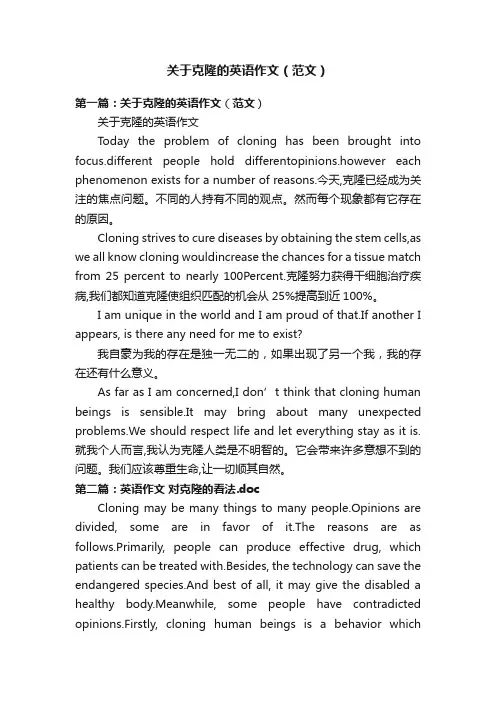
关于克隆的英语作文(范文)第一篇:关于克隆的英语作文(范文)关于克隆的英语作文Today the problem of cloning has been brought into focus.different people hold differentopinions.however each phenomenon exists for a number of reasons.今天,克隆已经成为关注的焦点问题。
不同的人持有不同的观点。
然而每个现象都有它存在的原因。
Cloning strives to cure diseases by obtaining the stem cells,as we all know cloning wouldincrease the chances for a tissue match from 25 percent to nearly 100Percent.克隆努力获得干细胞治疗疾病,我们都知道克隆使组织匹配的机会从25%提高到近100%。
I am unique in the world and I am proud of that.If another I appears, is there any need for me to exist?我自豪为我的存在是独一无二的,如果出现了另一个我,我的存在还有什么意义。
As far as I am concerned,I don’t think that cloning human beings is sensible.It may bring about many unexpected problems.We should respect life and let everything stay as it is.就我个人而言,我认为克隆人类是不明智的。
它会带来许多意想不到的问题。
我们应该尊重生命,让一切顺其自然。
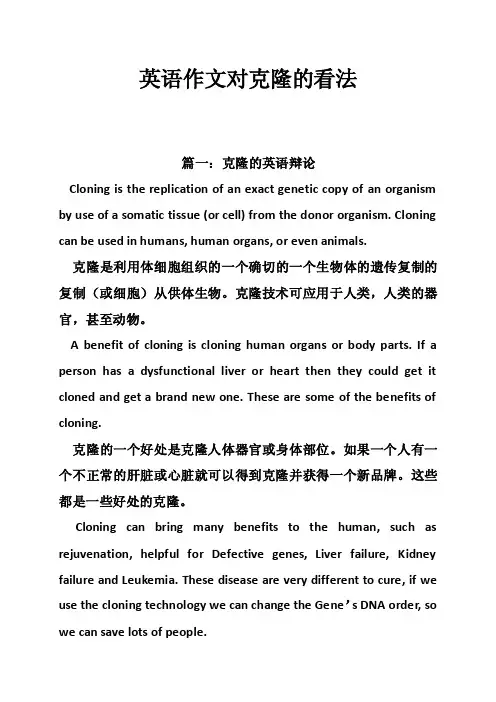
英语作文对克隆的看法篇一:克隆的英语辩论Cloning is the replication of an exact genetic copy of an organism by use of a somatic tissue (or cell) from the donor organism. Cloning can be used in humans, human organs, or even animals.克隆是利用体细胞组织的一个确切的一个生物体的遗传复制的复制(或细胞)从供体生物。
克隆技术可应用于人类,人类的器官,甚至动物。
A benefit of cloning is cloning human organs or body parts. If a person has a dysfunctional liver or heart then they could get it cloned and get a brand new one. These are some of the benefits of cloning.克隆的一个好处是克隆人体器官或身体部位。
如果一个人有一个不正常的肝脏或心脏就可以得到克隆并获得一个新品牌。
这些都是一些好处的克隆。
Cloning can bring many benefits to the human, such as rejuvenation, helpful for Defective genes, Liver failure, Kidney failure and Leukemia. These disease are very different to cure, if we use the cloning technology we can change the Gene’s DNA order, so we can save lots of people.克隆也会给人类带来很多好处,如振兴,有利于缺陷基因,肝功能衰竭,肾功能衰竭和白血病。
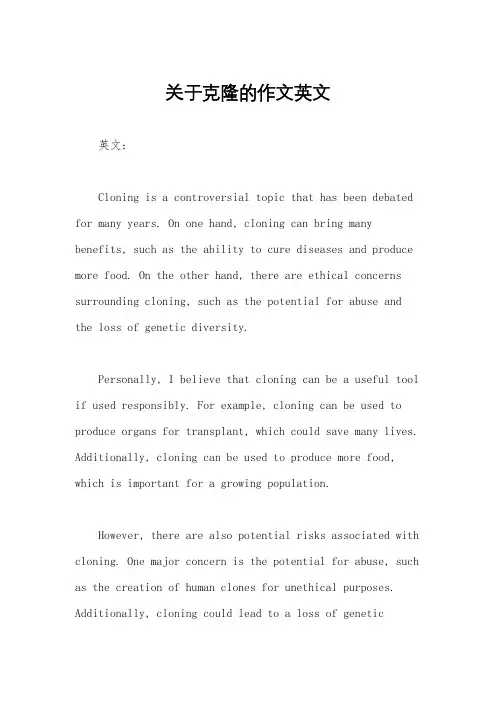
关于克隆的作文英文英文:Cloning is a controversial topic that has been debated for many years. On one hand, cloning can bring many benefits, such as the ability to cure diseases and produce more food. On the other hand, there are ethical concerns surrounding cloning, such as the potential for abuse and the loss of genetic diversity.Personally, I believe that cloning can be a useful tool if used responsibly. For example, cloning can be used to produce organs for transplant, which could save many lives. Additionally, cloning can be used to produce more food, which is important for a growing population.However, there are also potential risks associated with cloning. One major concern is the potential for abuse, such as the creation of human clones for unethical purposes. Additionally, cloning could lead to a loss of geneticdiversity, which could have negative consequences for the environment.Overall, I believe that cloning should be approachedwith caution and used only for beneficial purposes. While there are potential benefits to cloning, it is important to consider the potential risks and ethical concernsassociated with this technology.中文:克隆是一个备受争议的话题,已经被争论了多年。
克隆利弊的英文作文英文:Cloning is a controversial topic that has been debated for many years. There are both advantages and disadvantages to cloning.On the one hand, cloning can be beneficial in medical research. For example, scientists can clone animals to study diseases and test new treatments. This can lead to the development of new medicines and therapies that can save lives. Additionally, cloning can be used to preserve endangered species. By cloning animals that are on the brink of extinction, we can ensure that their species will continue to exist.On the other hand, there are also many drawbacks to cloning. One major concern is the ethics of cloning. Many people believe that cloning is playing God and that it is wrong to create life in this way. Furthermore, there is arisk that cloning could lead to a reduction in genetic diversity, which could make certain species more vulnerable to disease and other threats.In my opinion, cloning has both advantages and disadvantages. While it can be beneficial in medical research and conservation efforts, it is important to consider the ethical implications of cloning. We must also be aware of the potential risks and drawbacks of cloning.中文:克隆是一个备受争议的话题,已经被辩论了很多年。
反对克隆的理由英语作文English: Cloning is a controversial topic with many ethical, moral, and practical implications. One of the main reasons why people oppose cloning is because it raises serious ethical concerns regarding the manipulation and exploitation of human life. Cloning involves creating a genetically identical copy of an existing organism, which raises questions about the uniqueness and individuality of each person. Additionally, there are concerns about the potential misuse of cloning technology for unethical purposes, such as creating designer babies or harvesting organs from clones. Cloning also poses risks to the health and well-being of the cloned individual, as there have been instances of genetic abnormalities and health issues in cloned animals. Furthermore, cloning raises concerns about the impact on genetic diversity and the environment if cloned organisms were to be introduced into the ecosystem. Overall, the moral, ethical, and practical issues surrounding cloning provide strong reasons to oppose this technology.中文翻译: 克隆是一个备受争议的话题,涉及众多伦理、道德和实际影响。
英语作文对克隆的看法Cloning, as a controversial issue, has been a hot topic for years. Some people argue that cloning is a breakthrough in science, while others believe it is a dangerous and unethical practice. In my opinion, cloning should bestrictly regulated and limited to certain applications.On the one hand, cloning has its advantages. One of the most significant benefits of cloning is the potential to cure diseases. Scientists can clone cells to create tissues and organs, which can be used for transplantation. This can save countless lives and improve the quality of life for many people. Furthermore, cloning can be used to preserve endangered species. By cloning endangered animals, we can prevent them from becoming extinct and maintain the biodiversity of our planet.On the other hand, cloning also has its drawbacks. One of the biggest concerns is the ethical implications of cloning. Cloning can be seen as playing God, as it involvescreating life in a laboratory. Additionally, cloning can lead to a lack of genetic diversity, which can result in weakened immune systems and increased susceptibility to diseases. Moreover, cloning can be used for nefarious purposes, such as creating armies of identical soldiers or producing designer babies.In my opinion, cloning should be strictly regulated and limited to certain applications. While the potential benefits of cloning are significant, the ethical concerns cannot be ignored. Cloning should only be used for medical purposes, such as creating tissues and organs for transplantation. Furthermore, cloning should be used to preserve endangered species, but only under strict guidelines and regulations. Finally, cloning should be banned for any other purpose, such as creating armies of soldiers or producing designer babies.In conclusion, cloning is a complex issue with both benefits and drawbacks. While it has the potential to cure diseases and preserve endangered species, it also raises ethical concerns and can be used for nefarious purposes.Therefore, cloning should be strictly regulated and limited to certain applications. It is important that we carefully consider the potential consequences of cloning and make informed decisions about its use.。
对克隆人的看法,好处和坏处英语作文全文共5篇示例,供读者参考篇1My Views on Human CloningHi there! My name is Timmy and I'm 10 years old. My teacher Mrs. Johnson asked us to write about what we think of human cloning for our science class. At first, I didn't really know much about it. But then I did some research on the internet and asked my parents, and now I have some thoughts I want to share.What is Human Cloning?Human cloning is when scientists make an exact genetic copy of a person. They take some cells from that person's body and use special technology to grow a whole new person that is basically an identical twin, even if they are born many years apart. Crazy, right?The Good Things About CloningOne good thing about cloning is that it could help people who can't have babies the normal way. If a couple struggles to get pregnant, the scientists could clone one of them so they canstill have a child that is biologically related to them. That would make a lot of people really happy who always dreamed of being parents.Another awesome use could be cloning really good people to make more of them! If we could clone generous people like charitable donors or hardworking leaders, that means there would be more kind and helpful people in the world making it a better place. Cloning could also let us copy amazing scientists and doctors to have spares to work on curing diseases and stuff.The last big benefit is that parents who tragically lose a child might be able to have their baby cloned and get them back. I can't imagine how heartbroken I would be if I lost my little sister Lucy. If we could clone her, it would be like getting her back as a newborn baby again. For families who lose a child, that could mean the world to them.The Bad Stuff About CloningEven though there are some good reasons for human cloning, there are a bunch of downsides too that really worry me. One of the biggest problems is that a clone is not exactly the same as the original person they copied. Their genes might be identical, but the way they grow up and get influenced by the world around them would be completely different.Let's say scientists cloned my friend Johnny because he's a nice, smart kid. Well Johnny's clone would be a totally new person who might not turn out nice and smart at all! What if the clone ended up being a bully or struggled in school? Just because they share DNA, doesn't mean they would act the same. Having a clone might not match people's expectations.Another scary possibility is cloning being misused for evil purposes, like if a powerful dictator wanted to clone themselves and their soldiers to take over more territory. Or a criminal mastermind could create clone henchmen to do crimes for them. Cloning in the wrong hands could be a great danger to society.There's also the issue of how ethical and moral it is to create cloned humans. Since it's such a new area of science, we don't know much about if clones could have health issues, disabilities, or shorterlife spans compared to people born naturally. It might be unethical to intentionally bring clones into the world if they may suffer more. Playing with life like that could be considered wrong.My Final ThoughtsAll in all, I can see some really powerful ways that human cloning could potentially help people and be a scientific breakthrough. But I also have a gut feeling that it's reallyunnatural and comes with a lot of risks too. We would have to be extremely careful about when and why we decide to clone someone.Personally, I don't think I would ever want to be cloned myself. The idea of there being another "me" out there is kinda creepy! I'm one of a kind and don't need a clone. But if cloning could save another kid's life who is really sick, then I guess it could be acceptable in certain cases. cloning is a very complicated issue with no straightforward right or wrong answer. We would need to have a lot of rules, regulations and safeguards in place before it becomes routine. Until then, I'm happy being my one and only self! Let me know what you think about cloning too. This is just my opinion as a 10-year-old kid.篇2My Views on CloningHi there! My name is Jamie and I'm going to tell you what I think about cloning. Cloning is when scientists make an exact copy of something living, like an animal or even a person! Isn't that wild?Some people think cloning is really cool and can help us a lot. But others think it's scary and unnatural. I've been learning about it in school and I have some thoughts I want to share with you.The Good Things About CloningOne cool thing about cloning is that it could help cure diseases. Let me explain... Scientists can clone stem cells, which are kind of like baby cells that can turn into any type of cell in the body. Maybe they could clone stem cells from a healthy person, then use those to replace the sick cells in someone with a disease and cure them! How amazing is that?Cloning could also bring back endangered animals from extinction. If there was just one left of a certain animal, maybe they could clone it to make more. That way the whole species doesn't disappear forever. We could save so many cool creatures!Another benefit is that cloning lets scientists study human development from the very start by cloning embryos. They wouldn't actually let the clones be born, but they could learn more about how we grow inside the womb. That could lead to important medical breakthroughs.Some families who can't have babies naturally are really hoping cloning could one day let them have a child who is biologically related to them. I can understand why they would want that so badly.The Scary Things About CloningEven though cloning could do a lot of good things, there are reasons why some people are scared of it too. Here are some of the arguments against it:For one thing, we still don't fully understand cloning and it could have unknown risks. What if the clones ended up having major health problems or deformities that we didn't expect? That would be awful.Some people worry that if we allow cloning for medical purposes, it could lead to letting people clone themselves or make "designer babies" by picking traits like intelligence and looks. Many think crossing that line would be unethical and could lead to a very unequal world.Another big concern is what would happen if cloning technology got into the wrong hands. Maybe evil people would try to clone others without their permission to steal items orimpersonate them. Or they could even clone them to harvest their organs! That's seriously creepy to think about.A lot of people have moral objections to cloning humans because they believe life is sacred and we shouldn't be "playing God" by making copies of people. They think it goes against the natural order.My Personal ThoughtsSo those are some of the main pros and cons of cloning that I've learned about. Personally, I can see good points on both sides of the issue. I think cloning stem cells or animals for medical reasons could be really positive if it's properly regulated to be safe and ethical. But I do have concerns about it going too far and being abused.I don't think I would ever want to be cloned myself! Can you imagine having an identical twin copy walking around? That would be so bizarre. What if people got us mixed up or we didn't get along? No thank you!Overall, cloning is a very complex issue with important arguments on both sides. I think the decision篇3Cloning: The Good, the Bad, and the WeirdHave you ever watched a cool science fiction movie where there are two of the same person? That's kind of what cloning is! Cloning means making an exact genetic copy of something. Scientists can clone plants, animals, and even humans.I think cloning is a really fascinating topic. On one hand, it could lead to amazing medical breakthroughs and helping endangered species. But on the other hand, it seems kind of unnatural and could be misused. Let me break it down for you:The Good Things About CloningOne awesome benefit of cloning is that it could save people's lives through medicine. Let's say someone needs a bone marrow transplant but none of their family members are a match. Well, scientists could potentially clone that person's cells and use the cloned cells for the transplant instead. How cool is that?Cloning could also help bring back endangered or even extinct animals. Imagine if we could clone the very last remaining pandas or woolly mammoths from centuries ago? We might be able to increase their tiny populations and keep them from going extinct. As an animal lover, I think that's really important.Another fascinating use could be cloning organs for transplants. There's a huge shortage of organ donors, but what if you could clone a heart or liver or kidney just for transplants? It would save so many lives.The Bad Things About CloningEven though cloning has potential benefits, there are a lot of risks too. One major concern is whether cloned animals or humans could have health problems since cloning is still a new technology. The first cloned sheep, Dolly, only lived for 6 years when she was supposed to live much longer. What if a cloned person ended up being really sick?Another worry is that cloning could be misused in unethical ways. Maybe a rich person would want to clone themselves or a family member instead of having biological kids. Or a corrupt scientist could try cloning powerful leaders or geniuses. That seems really messed up to me.Cloning also raises deep philosophical questions – like, would the clone have a soul? Would they be considered their own person or a copy of someone else? I'm not sure I have the answers to those big questions.Cloning Weird FactsOkay, now that we've covered the pros and cons, let me hit you with some freaky cloning facts:In 2018, scientists successfully cloned monkeys for the first time ever using the same technique as Dolly the sheep. Imagine a bunch of clone monkeys running around!A company already offers a service to clone your pet dog or cat when it dies so you can get a genetically identical new puppy or kitten. Isn't that bananas?Some people believe that famous musicians like Michael Jackson and Tupac were actually clones, which is why they were so talented. I'm not sure I buy into those wild conspiracy theories though.A few companies are trying to clone extinct species like the woolly mammoth and even bring back dinosaurs usingmillion-year-old DNA. A real life Jurassic Park? Sign me up!My Final ThoughtsCloning is definitely a complicated issue with plenty of potential upsides and downsides to consider. Personally, I'm in favor of responsible cloning for medicine, conservation, and scientific research as long as there are strict rules in place. Butusing cloning for trivial reasons or in unethical ways seems really wrong to me.At the end of the day, we're still just scratching the surface of this incredible technology. Who knows what mindblowing cloning breakthroughs the future will hold? Maybe I'll even get to meet a cloned dinosaur someday. A kid can dream, right?篇4My Thoughts on CloningHi there! My name is Jamie and I'm 10 years old. Today I want to share my thoughts about cloning with you. Cloning is when scientists make an exact copy of something living, like an animal or even a person. It's a very fascinating but also controversial topic.I first learned about cloning from watching a science TV show. They talked about Dolly the sheep, who was the first cloned adult mammal back in 1996. Can you believe scientists made an exact copy of an adult sheep? It's like making a twin, but not the normal way with a mom having babies. With cloning, there's no mom or dad involved!At first, I thought cloning was really cool. Imagine being able to clone your beloved dog or cat so you never had to saygoodbye when they died? Or what about cloning endangered species to help them from going extinct? Those seem like great reasons to keep working on cloning technology.But then I learned about some of the ethical issues around cloning, especially for cloning humans. Many people are against it for religious reasons. They think only God should create human life. Others are worried about safety - what if the clones ended up with birth defects or health problems? That would be terrible.Another big concern is how cloning could be misused. Maybe evil scientists will try to make copies of famous athletes or geniuses. Or governments might even clone humans to create babies they can turn into soldiers! That's really scary to think about.Personally, I can understand both sides. Cloning animals and plants could help us solve problems like hunger, disease, and endangered species. But cloning humans? I'm just not sure it's a good idea given all the risks involved. We should probably focus more on normal reproduction to create human babies the natural way.What if your clone turned out smarter, better looking, or more talented than you? Would you feel jealous or sad? I know I would! Having a clone could really mess with your identity andself-esteem. It's one thing to have a identical twin you were born with, but intentionally creating your clone just feels different and a little strange to me.On the other hand, maybe it would be amazing to have a clone? You could send them to do your chores or homework while you goof off! Just kidding...I actually do my own homework, I promise. Having a clone could be like having a best friend who is exactly like you in every way. You'd never argue because you'd always agree on everything. Sounds pretty awesome, right?So those are some of the pros and cons I can think of when it comes to cloning. Like lots of scientific advancements, it's a powerful technology that could be used for good or bad purposes. We need to be super careful about how it gets used, especially for cloning humans. Maybe it should be totally banned? Or maybe just heavily regulated with strict rules? I don't have all the answers.But I do know this - if human cloning ever does become legal and safe one day, I really hope I get to decide for myself whether I want to be cloned or not. Having a clone forced on me against my will doesn't sound fun at all. Wouldn't you feel the same way?In conclusion, cloning is an incredibly complex issue with a lot of advantages and disadvantages to consider. For now, I lean more towards supporting animal cloning for certain purposes, but being very cautious and maybe even stopping human cloning, at least until we know much more about it. What do you think? I'd love to hear your perspective!篇5Cloning - Is It Good or Bad?Have you ever wanted to have a twin? Well, with cloning you can have an identical copy of yourself! Cloning is when scientists take a cell from someone and use it to create another living thing that is exactly the same as the original. It sounds kind of crazy and like something from a sci-fi movie, but it's real.Cloning animals has already happened. Scientists have cloned sheep, cats, cows and even a horse! But cloning humans is a lot more complicated and controversial. Some people think it's an amazing scientific breakthrough that could help solve lots of problems. Other people think it's unnatural and wrong to clone humans. There are good points and bad points to consider about human cloning.The Good Things About CloningOne of the best things about cloning is that it could help couples who can't have babies naturally. If they had a clone made of one of them, it would be just like having their own biological child. Another good use could be cloning people who have life-threatening diseases that need a perfect tissue or organ match for treatment. The clone would be the ideal donor match.Cloning could also let families who have lost a loved one bring them back in a way. For example, if a family's child tragically died young, they could have that child cloned and raise them again from birth. Or if someone's parent died, they could choose to clone them and have that parent figure in their life again as their "twin."Another interesting potential use is cloning extremely talented people like scientists, artists, musicians, or athletes. Having clone copies of geniuses like Albert Einstein or clones of star athletes could really benefit society and advance their fields further.Plus, clones would be amazing for studying how different factors impact human development. If you had two clones raised in different environments, you could learn so much about how things like nutrition, education, and living conditions shape who we become.The Bad Things About CloningA big downside of cloning is that no one knows if clones would be exact copies personality-wise or if they would be very different people. Our genes don't determine everything about us, so the clone could end up having a totally different personality than the original person they were cloned from. That could lead to a lot of disappointment if people expect clones to be just like someone they knew and loved.Cloning also raises a lot of ethical issues. Is it right to create a human life just to use it for research or donating body parts? Clones might feel like they have no purpose except what they were created for. Some people think it's demeaning and that clones deserve the same rights as anyone else born naturally.Another concern is the possibility of creating an unfair genetic elite if only the rich and powerful can afford to clone themselves and their families. Society could become very imbalanced if there are batches of duplicate individuals with genetically enhanced traits.There are also worries that if something went wrong during the cloning process, clones could end up being born with terrible deformities or health problems through no fault of their own.Animal cloning experiments have had lots of failures where the clones died shortly after birth or were not properly developed.The Verdict?Personally, I think cloning could have some useful applications for medicine and science if it's properly regulated. But I don't think it should be used frivolously for vain reasons like giving someone an identical twin of themselves or bringing back someone who died. That just seems unnatural to me.I also worry about the ethics and potential for human clones to have disturbing lives where they feel more like objects than real people. If we someday allow human cloning, we need to be absolutely certain clones would be raised with unconditional love and all the same rights as anyone else.There's still so much we don't understand about cloning. But I find the whole idea amazing and a little bit scary at the same time. What would you choose - to be cloned or not to be cloned? That is the question!。
对克隆技术的看法高中英语作文克隆技术,从出现的时候就已经备受争议了。
克隆技术的出现到底是好还是不好呢?下面是店铺为你整理的对克隆技术的看法高中英语作文,希望你喜欢!对克隆技术的看法高中英语作文篇1Nowadays, the controversial issue of cloning has been in the limelight and has aroused wide concern in the public. It’s quite understandable that the views of this issue vary from person to person.Some people are in favour of cloning, who firmly believe that scientists can bring the extinct animals back to life by cloning. It’s indisputable that cloning is a great process to produce quantities of commercial plants as well as new species of plants.However, the cloning of the sheep Dolly attracted public’s attention but arouse a storm of objections. For instance, if heaps and heaps of evil leaders like Hillary attempt to clone themselves, a disaster will break out in the world. In addition, the objectors insist that cloning has a huge impact on genetic diversity.As for me, I suggest that cloning plays an important role on improving our quality of life. Needless to say, that cloning is an effective access to cure serious illnesses that at present have no cure. What’s more, not only can cloning assist us to acquire unknown knowledge about the creature, but it also is a wonderful breakthrough. Thought now there are lots of questions about cloning, by no means should we give in to the unsolved problems.如今,关于颇受争议的克隆问题已经明确地引起了大众广泛关注。
克隆的看法英文作文英文,。
When it comes to cloning, there are many different opinions out there. Some people believe that cloning is a great scientific advancement that will help us cure diseases and improve our lives. Others, however, are more skeptical about the idea of cloning, and worry about the ethical implications of creating life in a laboratory.Personally, I am somewhat torn on the issue of cloning. On the one hand, I can see the potential benefits of being able to clone cells and tissues for medical purposes. For example, if someone needs a new kidney, we couldpotentially clone a kidney for them instead of relying on a donor. This could save countless lives and improve the quality of life for many people.On the other hand, I do have some concerns about the idea of cloning entire organisms. While it might betempting to try and bring back extinct species or create perfect copies of beloved pets, I worry about the unintended consequences of playing God in this way. What if the cloned animals suffer from health problems or have shorter lifespans than their natural counterparts? What if we accidentally create a new disease or mutation by manipulating genetic material in this way?Overall, I think that cloning is a complex issue that requires careful consideration and ethical guidelines. While there may be some potential benefits to cloning, we need to weigh these against the risks and potential consequences. Ultimately, I think that we should proceed with caution when it comes to cloning, and prioritize the well-being of both humans and animals in any scientific research.中文:谈到克隆,有很多不同的观点。
I very much agree with the author's viewpoint: will power will overcome all. The will power of everyone is very important, it is our forward momentum.
Firstly, will power can help us to overcome disease. For example, everyone knows the story of Helen Keller, who is the well-known American author and educator but was blind and deaf. With the supporters of her spirit, she learned to speak and write. It was will power lead her to success. Secondly, will power can help us out of woods and save our lives. Some explorers lost in the desert with no food or water. If they have a strong desire to survive and are convinced that the Oasis will be founded, they will walk on and on and survive eventually. If they give up, they are waiting to die. Thirdly, in our daily life, will power is very necessary for us to overcome the difficulties in our work and study and to achieve our objectives.
But you will say some people who have cancer still will die though they have strong will to live. But I think they gain a lot during their fighting with the disease. Maybe they will live longer or maybe they will understand more meaning of the life. We access to our goals with will power and the process is all.
So we should establish goals and strive to achieve it with will power.。